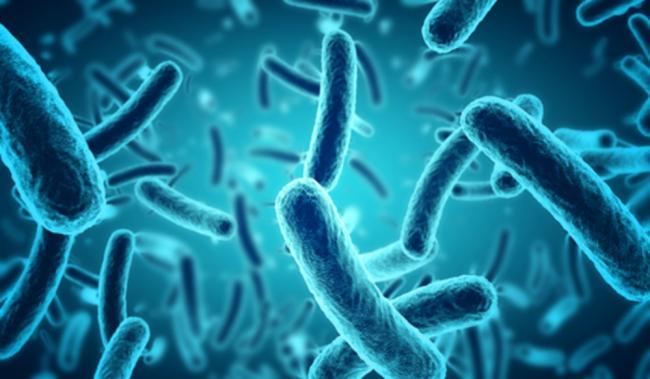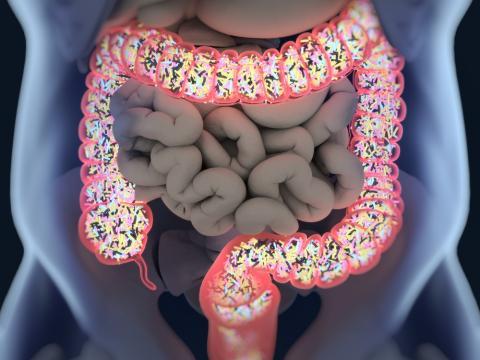Everyone’s intestinal microbiota is unique to that person since a number of factors influence its development and composition. One period in our lives that has a key impact on its development is early childhood. From the moment of birth onwards, external micro-organisms enter the baby’s gastrointestinal tract as a result of contact with its environment (family members, breast-feeding, bottle-feeding, breathing, etc.). In this way, infants build up an increasingly diverse and complex gut microbiota during their first few years of life, which stabilises when they are about 2 to 3 years old.
This process of microbial “colonisation” can have profound impacts on health throughout the child’s life. Many research projects have focused on determining its effects on certain diseases: diarrhoea, atopic dermatitis, respiratory allergies, etc.
The composition of a child’s intestinal microbiota plays a key role in the development of their immune defence system.
The newborn’s intestinal microbiota
The intestinal microbiota begins to develop at birth as a result of breathing, physical contact with family members, breast-feeding followed by normal feeding, etc. As a result of exposure to maternal microbiota (vaginal, intestinal, skin) and micro-organisms in the environment, the child slowly cultivates a diversified microbiota which reaches a mature form, similar to that of an adult, at about 2 to 3 years of age.
Up until this age, new colonies of micro-organisms gradually establish along the length of the gastrointestinal tract. The majority of these micro-organisms are essential for transit and digestion, but also for the correct functioning of the immune system. Some others may turn out to be harmful and to be involved in the development of diverse pathologies such as overweight, allergies, inflammatory bowel diseases, etc.
Although the gastrointestinal tract is generally considered to be sterile at birth, recent scientific studies have suggested that the gastrointestinal tract of children might be colonised by micro-organisms present in the intrauterine environment1,2. This phenomenon is called “prenatal colonisation”.
Key figures
Three phases in the development of the microbiota: childhood, adulthood, older years
2 - 3 years: first phase of maturation of the human intestinal microbiota
800 to 1,000 bacterial species make up the adult intestinal microbiota

What factors influence the development of the intestinal microbiota?
The intestinal microbiota gradually becomes richer and more complex until it reaches maturity in children when they are about two to three years old. Its development is influenced by numerous factors3 :
- Intrauterine contamination appears to occur during the prenatal stage: the intestinal microbiota of the fœtus might be positively affected by the micro-organisms which evolve in the intra-uterine environment such as bifidobacteria, lactobacilli or enterococci.
- The duration of the pregnancy4 has an impact on the extent to which the microbiota has developed at birth. As a result, the intestinal microbiota of premature babies is less diverse and certain species, such as strict anaerobes, take longer to establish after birth.
- Delivery method5 appears to influence the conditions in which the intestinal microbiota is colonised. After a vaginal delivery, there appears to be a more diverse population in the gastrointestinal tract of bacteria belonging to the Bifidobacterium genus. After a caesarian delivery, the microbial diversity appears to be weaker, particularly with a smaller quantity of bacteria belonging to the Bacteroidetes phylum. Studies have demonstrated that this lower level of diversity might contribute to the risk of developing diseases later in life, such as asthma6.
- The infant’s diet7 appears to have an impact on the development of the intestinal microbiota. Breast-feeding modulates the composition of the intestinal microbiota and increases the presence of bifidobacteria and lactobacilli in the very young, whereas infant formula milk encourages a dominance of Enterobacteriaceae. The introduction of solid food also plays a significant role in the development of the intestinal microbiota.
- The infant's environment – dependent on many factors: geographical, cultural, etc. – has a direct impact on the development of the intestinal microbiota during the first few months or years of life. This was well illustrated by an analysis of the intestinal microbiota of children in Burkina Faso that revealed a prevalence of bacteria from the Bacteroidetes phylum, whereas the intestinal microbiota of Italian children was dominated by the Firmicutes phylum8.
- A course of antibiotics significantly degrades the intestinal microbiota and appears to reduce its microbial diversity9-10-11
- The consumption of probiotics, both during pregnancy (by the mother) and after birth (by the infant), might have a positive impact on the development of the intestinal microbiota.
Antibiotics and overweight: a combination under scrutiny
Taking a course of antibiotics12,13 during childhood has an impact on the composition of the intestinal microbiota, notably by reducing its diversity. What are the consequences? Increased risk of Crohn’s disease, coeliac disease, obesity, eczema and asthma… Numerous studies have also investigated the relationships between a course of antibiotics and overweight in children. Taking antibiotics during the first years of life might lead to subsequent overweight, notably in boys. A Canadian study observed a higher central adiposity in preadolescents (9 – 12 years old) who had been exposed to antibiotics during their first year of life.

The benefits of probiotics on a child's intestinal microbiota
In children, numerous studies have looked at the benefits of taking probiotics as a therapy, particular for colic, acute diarrhoea and atopic dermatitis.
- Acute diarrhoea: bacterial or viral, is more common in industrialised countries (between 1.3 and 2.3 episodes per child). As a preventive therapy for diarrhoea, probiotics appears to modulate the infant’s intestinal flora and in so doing reduce the risk of infection. Taking probiotics appears to also shorten the duration of the symptoms of acute gastroenteritis. The Lactobacillus rhamnosus probiotic strain has been the focus of particular study for this indication. A meta-analysis conducted by Szajewska et al.14 considered 8 placebo-controlled, randomised studies and found that taking certain strains of probiotics such as the Lactobacillus rhamnosus strain was associated with a significant reduction in the duration of the diarrhoea (- 1.1 days).
- Atopic dermatitis: several scientific studies15,16 have identified an improvement in clinical symptoms and a reduction in intestinal inflammation in infants with atopic eczema. As a preventive therapy for atopic eczema – taken before birth by the mother and after by the child - probiotics appear to reduce the frequency of the symptoms.
- Respiratory infections: a scientific study17 recently demonstrated that a preventive administration of probiotics during the winter to young children (1 to 6 years old) might reduce non-attendance rates at day care centres due to sickness. A 17% reduction in respiratory infections was also observed in the treatment group. A further result was lower rates of use of antibiotics in the treatment group.
- CIBD (chronic inflammatory bowel diseases): in children with Crohn’s disease, taking probiotics might help to improve immunity.
- Infant colic: taking probiotics orally might help to improve the symptoms of colic in infants19.
Probiotics and the treatment of diarrhoea
In France, acute viral gastroenteritis is a common disorder, particularly in children looked after in larger groups Studies indicate that 90 % of children under 2 years old have already experienced at least one episode of viral intestinal infection... Several strains of probiotics are currently being studied to investigate their preventive effect on the development of diarrhoea20-21 .






